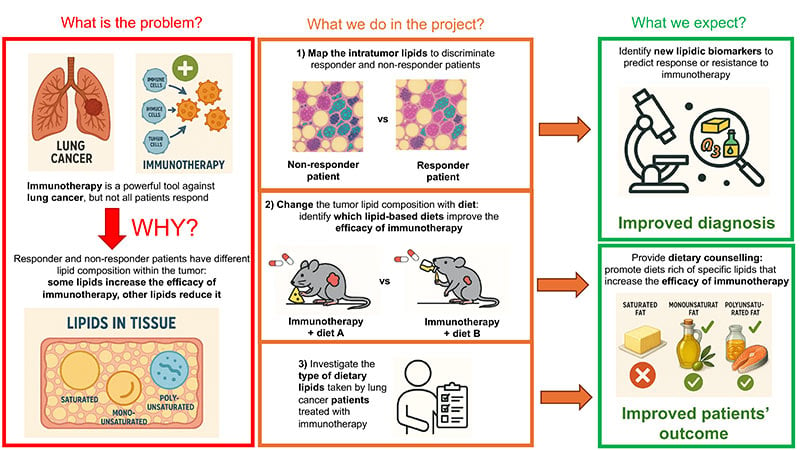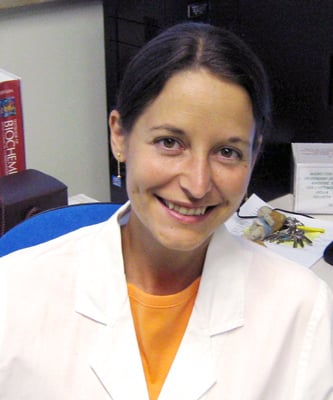Grant title: Polyunsaturated fatty acids improve immunotherapy efficacy in non-small cell lung cancer
Institution: University of Torino
Grant awarded: September 2025
Lipids are energy sources and building blocks for cancer cells: these multiple functions make their metabolism adapt to the plasticity that is required for cancer cells to survive cytotoxic agents. Changing lipid composition in the diet may change lipid composition in tumour and tumour-infiltrating immune cells, determining sensitivity or resistance to immunotherapy. Why can’t we try to improve the efficacy of immunotherapy by simple and cheap dietetic interventions?
World Cancer Research Fund is offering our research team unique support to investigate which types of lipids are associated with a better response to immunotherapy in lung cancer patients. Thanks to this project we may set the bases for diet-based future interventions that can change the prognosis of immunotherapy-treated patients – Prof Chiara Riganti
Background
Immunotherapy revolutionised the prognosis of several cancers. It has also been approved for lung cancer patients who are not candidates to receive chemotherapy and targeted therapies. However, the percentage of patients who have a positive and sustained response is about 30%. A better understanding of the mechanisms at the basis of resistance will help to explore new treatment options.
In preliminary studies we found that specific types of fatty acids (mono-unsaturated and poly-unsaturated fatty acids) improved how well immunotherapy worked and reactivated the immune system against the tumour cells. While saturated fatty acids produced the opposite effects.
Aims and objectives
The first objective of the project is to identify “good lipids” and “bad lipids”, easily detectable in tumour samples, that can predict if a patient will or won’t respond to immunotherapy. After having identified the “good lipids”, which we expect are mono- and poly-unsaturated fatty acids, our second objective is to identify the diets with the types of fatty acids that produce the greatest improvement in immunotherapy efficacy.

Created by Prof Chiara Riganti, University of Torino
How it will be done
To achieve our first objective, we will map the amount and type of lipids present in tumours derived from patients with good and poor response to immunotherapy. We will also investigate if good and bad lipids are contained in cancer cells or immune cells infiltrating the tumours.
To achieve our second objective, we will use a cutting-edge technology producing patients’ avatars, ie mice with patient tumours and human immune systems. They will be treated with immunotherapy and fed diets containing different types of lipids, mimicking the variety of diets that patients can follow. The use of mice is the only way that allows for the reproduction of dietetic interventions that may be applied to patients.
Potential impact
The study will have large scientific and socio-economic impacts. This study could transform lung cancer treatment by using personalised lipid profiles to identify patients most likely to benefit from immunotherapy, while implementing affordable, well-tolerated dietary interventions as a powerful, non-invasive strategy to boost treatment outcomes. By promoting diets rich in heart-healthy mono- and poly-unsaturated fats, key components of the Mediterranean diet, this approach not only has the potential to enhance immunotherapy efficacy but also to deliver further health benefits.
